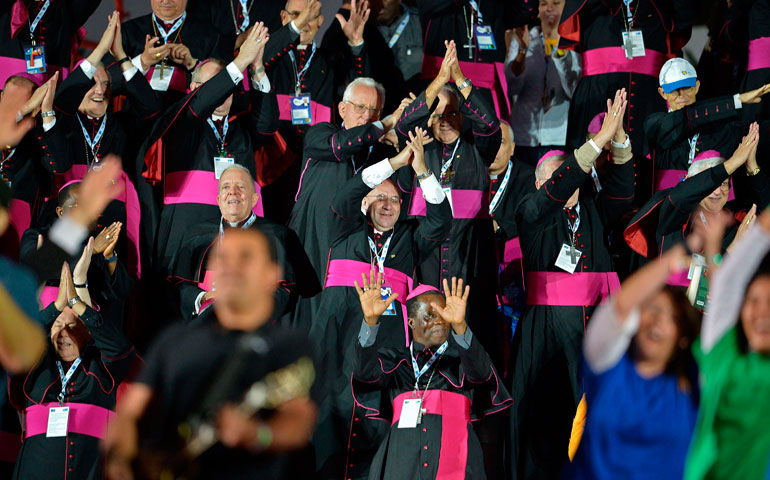
On July 27, bishops join the rehearsal of the dance to welcome Pope Francis at Copacabana beach in Rio de Janeiro during World Youth Day. (Getty Images/AFP Photo/Gabriel Bouys)
The lyrics of the theme song of World Youth Day 2013 say, "Christ invites us: 'Come to me, be my friends.' Christ, He sends us, 'Be missionaries!' " The song is not about bowing down in adoration to a distant divinity, but an invitation to move with Christ as his "friends."
At the Last Supper, Jesus said, "I no longer call you servants, but friends." His words were a revolutionary change of hierarchical relationships and they accompanied his shocking action of washing the feet of his friends. Peter was upset that Jesus was overturning his concept of power relationships.
Bloggers are angrily attacking the bishops who were dancing at World Youth Day in Rio de Janeiro July 28 as not displaying their position of power and solemnity. Perhaps the bishops were displaying more than ever that they follow Jesus, the person who reached out to all in friendship, compassion and joy.
The planners of World Youth Day got two professional Brazilian dancers, Fly and Glaucia, to choreograph a song called "Francis" created for the new pope. The simple dance and song were taught to more than 3.5 million people for what seems to have been the world's largest flash mob. The bishops joyfully and simply rehearsed the dance with the young people. While a version posted by YouMedia with Italian notes has more close-ups of the bishops, a version posted on YouTube by Alan Neville has more glimpses of the joy of the youth following the teachers and dancing bishops on the stage. Some of the bishops were laughing so much they were barely getting the moves!
The lyrics of song say, "Welcome, Francisco! How nice to hear your voice! Pray for me and for my brothers and sisters. Come, help us like the Redeemer! Bring us your blessings. One more ray of light, of hope, of love, and of peace!" The huge statue of Christ as the Redeemer was in prominent view for the pilgrims there.
Jessica Abejar, a New York performance artist and dancer, responded to the video, which was shared on the Sacred Dance Guild Facebook page: "I was there on Copacabana Beach! There & throughout the activities at World Youth Day, dance is much alive in the church! I saw it at morning Catechesis with my Brazilian brothers & sisters, with the South Africans during offertory at our Catechesis mass, throughout all the main events, & even in the streets of Rio as young pilgrims from all over the world danced 'samba para Cristo!' The Catholic Church is alive! Dance is a part of the new evangelization! There is a song in our hearts and the Holy Spirit that moves us! I am glad to have been a part of this amazing experience! And I am glad that I was also able to share in the new evangelization as a performer in their youth festival -- one of the largest religious art festivals in the world! What a blessing!"
St. Francis de Sales said you can get more flies with honey than vinegar. World Youth Day seemed to be winning more young hearts with joy than with harshness. St. Teresa of Avila said, "A sad nun is a bad nun. ... What would happen if we hid what little sense of humor we had?" and she was known for joyfully dancing. St. Ignatius of Loyola, giving spiritual direction to a person who was depressed, danced to help uplift the man's spirit. Stories say that St. Francis of Assisi led people in dancing to Christmas carols around the crèche. Pope Francis has mentioned that he likes tango.
Betsey Beckman, who leads a sacred dance ministry in Seattle, reflected on Abejar's words: "Dance is a part of the new evangelization! There is a song in our hearts and the Holy Spirit that moves us!" In an online communication with members of the Sacred Dance Guild, Beckman wrote, "I so appreciate the thoughtful articulation of what our call is for the church, and the most productive ways for us to be about dancing the reign of God into being!"
John West, who has led the Valyermo Dancers based at St. Andrew's Abbey in California since 1972 and frequently helps thousands pray at the Los Angeles Religious Education Congress through movement, noted, "The bishops looked like they were actually having fun and being human." West acknowledges the contribution of Gloria Weyman, who had danced with the Ballet Russe de Monte Carlo, and then worked extensively with liturgical theologian and composer Spiritan Fr. Lucien Deiss, establishing dance as a ministry in the modern church.
Currently, in some places in the U.S. church sacred dance flourishes and in other places it is suppressed. Does dance have to be justified as a part of the new evangelization? West notes, "A recent article in The New Yorker perhaps provides us an insight into the way forward for those of us who choose to work in this communion. It notes that Pope Francis sidesteps the issues of dogma and church law as frequently as possible. He chooses, instead, to set examples of the way we can best embrace the core of Christ's Gospel message. We don't need to be wrapped up in the arguments of ideologues, because it will serve only to push them into their limited corners of thought and reaction."
In Matthew 11:15-19, Jesus, Wisdom personified, invites us to recognize true wisdom. "Whoever has ears ought to hear. To what shall I compare this generation? It is like children who sit in marketplaces and call to one another, 'We played the flute for you, but you did not dance.' ... Wisdom is vindicated by her works."
Wisdom dances and then wisdom does good deeds. More than 3.5 million young people and bishops danced together. Let us see if they will live up to the theme song to go out and be missionaries who do good deeds.
[Sr. Martha Ann Kirk, a Sister of Charity of the Incarnate Word and a professor at the University of the Incarnate Word, is working on an oral history of Carla De Sola, a prominent sacred dancer, to accompany the collection of De Sola's papers in the archives of the Graduate Theological Union, Berkeley, Calif.]
